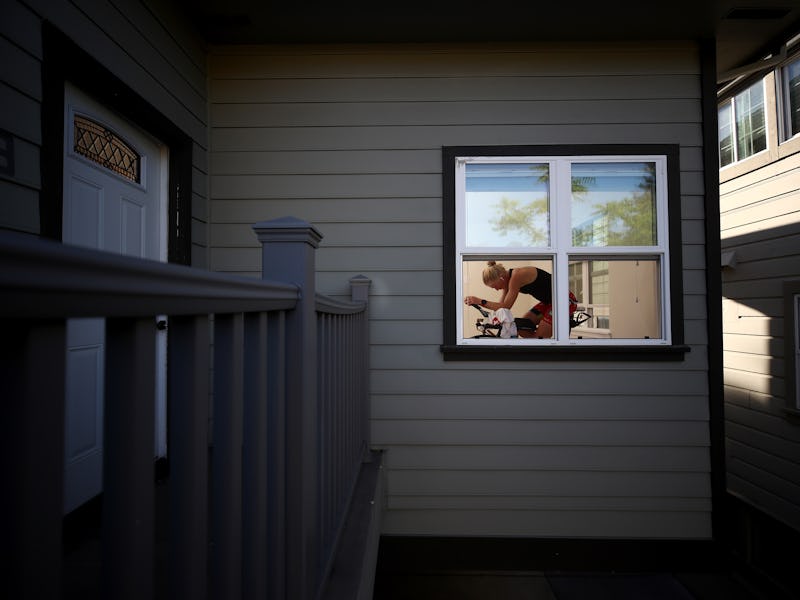Study pinpoints the best time to exercise if you want better sleep
When it comes to promoting sleep, not all forms of exercise are made equal.

Like Simon Cowell dressing down an off-pitch reality show contestant, scientists sometimes know how to kick you where it hurts.
“Despite the overwhelming consensus that both sufficient sleep and adequate exercise are pivotal in maintaining health, these behaviors are often deprioritized within the typical American lifestyle,” reads a scathing 2017 paper. “It should be of little surprise then that Americans who both lack proper sleep and fail to engage in regular exercise vastly increase their risk for chronic illness.”
Ouch.
Okay, so we know that we should be sleeping and exercising more. Americans also love a good deal: Is there a two-for-one situation at play here?
The answer is complicated, but essentially, yes. While it’s understood on an intuitive level that tuckering yourself can benefit sleep, there’s debate over to what extent it helps. Some studies have found moderate exercise ahead of bed is advantageous, and vigorous, high-intensity exercise (HIE) is not.
But a recent analysis of 15 studies published in the journal Sleep Medicine Reviews suggests a more nuanced situation, finding evening HIE performed two to four hours before bedtime did not disrupt sleep — but HIE performed one hour before bedtime did.
This result held across healthy, young, and middle-aged adults — and was especially true for more sedentary adults (the sort who sit all day at a desk job). Early evening HIE helped with sleep onset and improved sleep duration, and one type of exercise was found to be the most effective at spurring deep sleep: cycling.
Lead author Emmanuel Frimpong and co-author Melodee Mograss point out that this study is hopefully an encouraging sign to people who aren’t sure if they can squeeze in a workout. Frimpong is a postdoctoral fellow, and Mograss is a researcher associate at the Sleep, Cognition, and Neuroimaging Laboratory based in Montreal.
“We hope that our work will allow individuals ways for continuing with healthy behaviors such as exercise and sleep, even during busy periods,” Mograss and Frimpong told me by email.
The link between exercise and sleep
The study team reviewed previously published papers that examined the relationship between sleep and exercise, looking at variables linked to the time of activity. Overall, they found mixed, inconsistent results: because bodies, lifestyles, and sleep habits can be so different, it’s challenging to find a one-size-fits-all answer.
But specific patterns did emerge, including:
- The two to four hours before bed and one hour before bed difference
- The finding that cycling is especially beneficial
- An indication that onset and duration of sleep is positively associated with exercise that lasts between 30 and 60 minutes
Critically, these results were found among people who don’t have a history of sleep disorders. If you have consistent sleep problems, you may want to be more diligent about working out earlier: The analysis suggests HIE can slightly decrease rapid-eye-movement sleep, a phase of sleep that benefits learning, memory, and mood.
Night owls are also more likely to benefit from before-bed exercise than morning larks: The analysis suggests HIE performed late at night is more likely to cause sleep disturbances among early-risers.
Stationary cycling can promote better sleep.
“Timing or time of day for exercising is as important as the intensity of the exercise,” Mograss and Frimpong explain. “For exercise to benefit a night’s sleep, it should not be performed too close to bedtime. Even physically fit individuals who do late-evening exercise occasionally report sleep disturbances.”
As for cycling, the review found early evening cycling promoted sleep onset and deeper sleep than what was seen with running, Mograss and Frimpong explain. They’re careful to note that the review covered lab-based exercise and stationary cycling — not biking or jogging out on the streets.
“Compared to cycling, running may cause more physiological or psychological stress and muscle soreness,” they explain. “Because cycling is a low impact exercise, it tends to result in fewer injuries and soreness.”
The benefits of getting good sleep
The review authors reason that exercise can be considered part of overall sleep hygiene — the bedroom and daily routines that contribute to consistent, quality slumber. Other elements of sleep hygiene include:
- Showering between exercise and sleep
- Avoiding eating heavy meals before bed
- Drinking lots of water before bed
Quality sleep, in turn, benefits mental and physical health. For example, research suggests adding just 29 minutes of extra sleep per night can boost mindfulness. On the other end, waking earlier — but still getting the same hours of sleep — can lower the risk of depression.
Mograss and Frimpong say there are still unanswered questions. More studies are needed to understand, for example, how consistent evening exercise influences the sleep of people across different ages or with certain medical conditions.
They are currently in the process of recruiting 18 to 35-year-olds for their study, which will evaluate the participants’ memory and sleep after performing a 15-minute high-intensity exercise routine.
“The purpose of this study is to evaluate how exercise may compensate for the deleterious effect of sleep loss on memory,” they say. “This study has an ecological, real-world application given the 24/7 modern society, where healthy behaviors such as sleep and exercise are often sacrificed due to work, social, or other lifestyle commitments.”
This article was originally published on